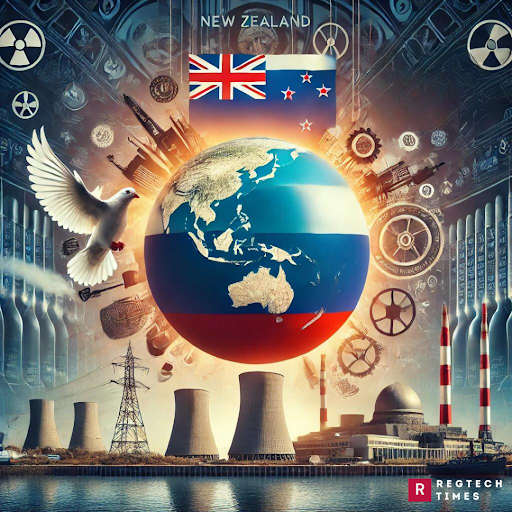New Zealand has introduced a fresh package of sanctions against Russia and Belarus, further tightening its stance on the ongoing war in Ukraine. The announcement was made by the Minister of Foreign Affairs, Winston Peters, who highlighted the need to respond to Russia’s illegal occupation of the Zaporizhzhia Nuclear Power Plant (NPP) in southern Ukraine. This latest move highlights New Zealand’s commitment to supporting Ukraine’s sovereignty while contributing to international efforts aimed at pressuring Russia to end its military aggression.
The sanctions package is aimed at individuals and organizations directly involved in the war effort, including key figures in the Russian military-industrial complex and Belarusian entities that are seen as supporting the invasion. The focus on the Zaporizhzhia NPP is significant, given the plant’s strategic importance and the heightened risk it poses to nuclear safety.
Russia’s Occupation of the Zaporizhzhia Nuclear Plant
Since March 2022, Russia has controlled the Zaporizhzhia NPP, Europe’s largest nuclear facility, located in southeastern Ukraine. The occupation has raised serious concerns internationally, with fears of a potential nuclear disaster similar to the Chernobyl catastrophe of 1986. The plant remains in a volatile situation, with its operations disrupted and the possibility of armed conflict around its premises causing widespread alarm.
International authorities, including the International Atomic Energy Agency (IAEA), have called for the demilitarization of the plant and warned that continued military presence and hostilities around such a sensitive site could lead to a nuclear disaster with regional and global repercussions. The plant remains a flashpoint in the war, with both sides blaming each other for attacks on its premises.
New Zealand, aligning with Western powers, has consistently condemned Russia’s actions in Ukraine. The occupation of the Zaporizhzhia NPP is seen as a serious violation of international law, with Russia using the plant as leverage in its broader conflict with Ukraine. Minister Winston Peters made it clear that New Zealand strongly opposes this occupation and called on to withdraw from Ukraine entirely, beginning with the critical nuclear facility.
Targeted Sanctions: Individuals and Organizations
The new sanctions introduced by New Zealand target five individuals and six organizations involved in supporting Russia’s illegal occupation of the plant and broader war efforts. These individuals are key players in Russia’s military-industrial complex, an essential part of the infrastructure that enables the country’s military operations in Ukraine.
Russian Startup IRT Blatantly Defies Western Sanctions with UAV Sales
The sanctions extend to Belarus, a crucial ally of Russia in the conflict. Belarus, under the leadership of President Alexander Lukashenko, has allowed its territory to be used for Russian military activities, including the initial invasion of Ukraine in February 2022. Belarusian entities that provide logistical or material support to Russia’s invasion are also included in New Zealand’s latest round of sanctions.
Winston Peters emphasized that these sanctions are a necessary response to the ongoing war crimes and aggression displayed by both Russia and Belarus. The restrictive measures aim to diminish the operational capacity of these individuals and organizations, cutting off financial and logistical support that has been instrumental in the war effort.
International Response and Pressure: New Zealand’s Role
New Zealand’s move follows a broader trend of international sanctions that have been imposed on Russia and its allies since the beginning of the Ukraine war. Western countries, including the United States, the European Union, the United Kingdom, and Australia, have already implemented sweeping sanctions targeting Russian elites, government officials, military suppliers, and key industries such as energy and finance.
These sanctions are designed to isolate Russia economically and diplomatically, making it increasingly difficult for the country to sustain its military operations. By targeting Russia’s military-industrial complex and Belarusian enablers, New Zealand hopes to exert pressure on the Kremlin to change its course in Ukraine.
Minister Peters reiterated New Zealand’s commitment to Ukraine’s sovereignty and territorial integrity. He pointed out that the sanctions are part of a wider international strategy to hold Russia accountable for its actions. New Zealand’s stance is in line with its long-standing principles of international law, human rights, and nuclear non-proliferation.
Future Prospects for Peace
While sanctions are a powerful tool in the international community’s arsenal, diplomatic efforts to end the war continue. Turkish Foreign Minister Hakan Fidan recently stated that the possibility of lifting sanctions could be a discussion point in future negotiations if talks to resolve the Ukraine conflict resume. However, the prospects for peace remain uncertain. Many analysts believe that various groups with vested interests in the conflict’s continuation could hinder diplomatic progress.
New Zealand’s sanctions are a clear signal of its position on the Ukraine crisis: a call for immediate cessation of hostilities, respect for international law, and the protection of nuclear facilities like the Zaporizhzhia NPP. As the conflict drags on, the international community’s resolve, including that of smaller nations like New Zealand, remains crucial in shaping the future trajectory of the war and its potential resolution.


